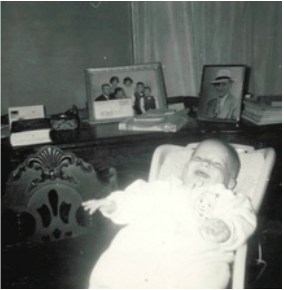 Baby Holly with photos of my father's family
Baby Holly with photos of my father's family A grief altar - this in and of itself was a foreign concept - literally. A tradition of the Dagara people of Burkina Faso in West Africa, brought to the grief-illiterate West by Sobunfu Some. Sobonfu's name means "keeper of the rituals". For the past twenty years she has shared the spiritual wisdom of her people with the West, through writings and rituals such as the one I attended at Breitenbush Hot Springs earlier this month.
Sixty of us gathered in the main lodge after dinner on Friday. In one large circle, in a space skillfully held by Sobonfu and her helpers, we began to voice something of the griefs that had brought us there. Suicide, war, life-changing tragedies, terminal illness, addiction, betrayal, abandonment. So many ways we'd been hurt, hurt others; so much pain and sorrow; such longing for reconciliation, redemption, relief. The first breaking of the silence.
The next morning after she shared her framework of beliefs around the types and stages of grief, we met in small groups to share a bit more of our stories. Sobunfu was clear: this was less about what we needed to learn about each other, and more about our grief finding its voice.
Then we rolled up the rugs, cleared the room, and worked in teams to prepare the altars. The forgiveness altar, draped in greens and blues on one side of the room, and the red- and yellow-swathed ancestors' altar on the other held items we'd brought from home, along with color coordinated flowers and candles. The grief altar at the base of the room was constructed out of fresh fir boughs: a three-sided teepee open to the front, a row of white candles standing sentinel across the opening; inside, a vase of white flowers, a white candle, a square of black cloth on the ground.
Sobunfu had instructed us in how to prepare a bundle containing objects that represented each of our griefs, along with something that could stand in for the unexpected griefs that might arise. With each object, we were to speak out loud, with great specificity, the dimensions of that particular grief. She had modeled several examples. "The grief of a friend dying from cancer?" I asked. She spun out a dozen sentences, all precisely accurate articulations of the inchoate pain I've been carrying for the five years since Marcy's diagnosis. After finding these words we were to wrap the objects in a cloth tied with string.
With our bundles prepared, we would enter the heart of the ritual. Sobonfu and her helpers maintained a drum line at the back of the room. For the next nearly 24 hours each of us, as we were moved, would go to the forgiveness altar, the ancestors' altar, or the grief altar. If not at one of the altars, we were supporting those at the grief altar through sitting behind another (each griever had one or more "followers" whose role was to witness but not sooth or stop the flow of grief) or by joining the drummers in a continuously sung song that vocalized the promise of carrying each other.
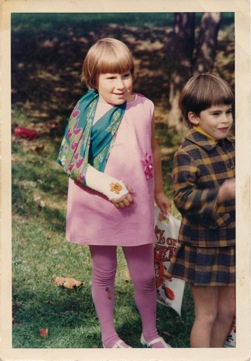 1st grade Holly
1st grade Holly Yet as I lowered myself to a cushion in front of the grief altar, a "follower" behind me ready to offer support, I was entirely unprepared for what was happening around me. Other mourners had begun to wail, to shriek, to scream and curse. It came to me as one of the unexpected griefs Sobonfu had predicted: the grief that in my life, in my family, grief has always been so silent. So. Silent.
In that space in that lodge before the grief altar I was pierced by the memory of the two times I'd heard the sound of grief growing up, two times my mother issued the unedited primal scream of a wounded animal. The first time, she was alone in our basement. The second time, in bed with us, her grade-school daughters, on the night my father finally left for good.
Those moments broke the intergenerational family code. I feel, even now, writing about it, a quickened pulse, a freezing in my chest. Don't feel. We don't know what to do with these feelings. Stay quiet. Don't make trouble.
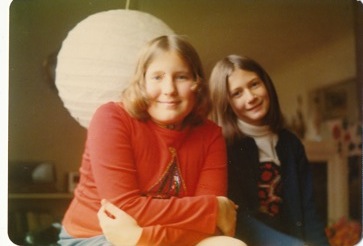 5th grade Holly with best friend Lisa
5th grade Holly with best friend Lisa I spent a lot of time at the forgiveness altar, too. I'm still trying to make friends with the child pictured here, the one who was trying to give voice to the grief all around her without a village that knew how to listen.


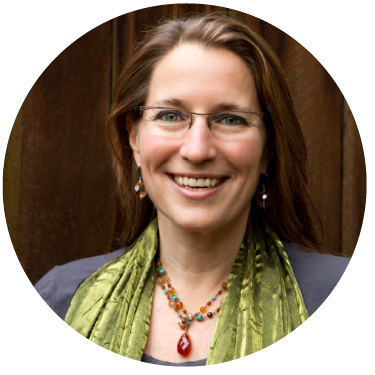
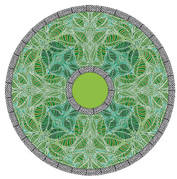
 RSS Feed
RSS Feed